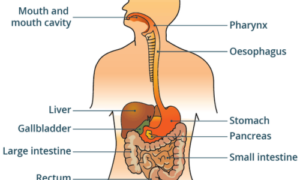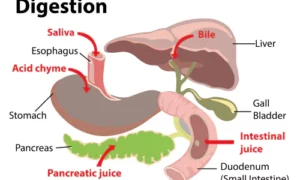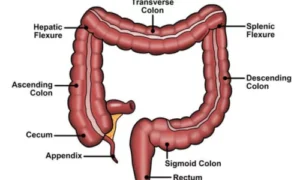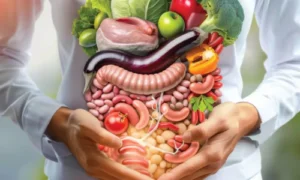Recently updated on June 18th, 2025 at 10:56 am
Digestion in human beings is an extraordinarily fascinating and important process that allows our bodies to receive the nutrients they require for energy, growth, and overall health. While the path from digesting food to eliminating waste may appear simple, the steps are intricate and meticulously coordinated by many organs, enzymes, and chemicals. In this article, we’ll go over the phases of digestion in humans, how each organ contributes to the process, and what you can do to maintain a healthy digestive system.
1. The Beginning of Digestion in Human Beings: The Mouth

The mouth is where digestion in human beings occurs. Some natural strategies that can help. Food is broken down into smaller pieces by mechanical digestion when we chew, and the chemical breakdown of carbohydrates is started by saliva. An enzyme called amylase is found in saliva and begins to convert starches into sugars. Peristalsis, a sequence of muscular contractions, helps swallow this mixture, now known as a bolus, and move it down the throat.
2. The Stomach’s Role in Digestion
After food enters the stomach, digestion in human beings continues with a combination of mechanical churning and chemical digestion. To further break down proteins into smaller peptides, the stomach secretes gastric fluids, which comprise hydrochloric acid and the enzyme pepsin. Additionally, the acidic environment eliminates dangerous microorganisms and gets the meal ready for the small intestine’s subsequent stage of digestion.
3. Digestion in the Small Intestine: The Main Nutrient Absorption Site

The small intestine is an essential organ for digestion in human beings since it is where the majority of nutritional absorption occurs. Pancreatic enzymes and hepatic bile are important in this situation. While pancreatic enzymes further break down proteins, lipids, and carbs, bile emulsifies fats and breaks them up into tiny droplets. Villi, which are microscopic projections that resemble fingers and cover the lining of the small intestine, increase surface area and aid in the absorption of nutrients into the circulation.
4. The Large Intestine: Water Absorption and Waste Formation

Human digestion proceeds to the large intestine, where water and electrolytes are reabsorbed, once the majority of nutrients have been absorbed. Beneficial gut bacteria aid in the breakdown of any leftover food particles at this point as well. The rectum holds the waste, which is now in the form of stool, until the body expels it.
5. Supporting Healthy Digestion in Human Beings
A well-functioning digestive system is critical for general health. To support digestion in human beings, eat a well-balanced diet high in fibre, drink lots of water, and engage in regular physical activity. Fibre helps move food through the digestive tract, reducing constipation, whilst water aids in nutritional breakdown and transport. Exercise helps with digestion by promoting the normal contraction of gut muscles.
Also See: Human Reproductive System
6. Common Issues in Digestion
Many causes can affect digestion in humans, causing unpleasant symptoms such as bloating, gas, constipation, and heartburn. Common digestive diseases include IBS, GERD, and lactose intolerance. These problems may necessitate dietary adjustments, drugs, or lifestyle changes to enhance digestion in humans.
7. The Importance of Gut Health

A recent study has demonstrated the importance of gut health in digestion in human beings. A healthy gut microbiome, or the diverse community of bacteria that live in the digestive tract, is important for not only digestion but also immunological and mental health. Consuming probiotic-rich foods such as yoghurt and fermented items might help maintain healthy gut flora and, as a result, aid with human digestion.
Conclusion: The Wonders of Human Digestion
In conclusion, digestion for human beings is a complex process involving several organs and systems that collaborate to ensure the body receives the nutrients it requires while eliminating waste. From the lips to the intestines, every step is critical to preserving health and energy. Understanding how human digestion works allows us to make better choices for our digestive health and overall well-being. Nurturing our digestive system, whether through nutrition, exercise, or stress management, is essential for a healthy lifestyle.







Αναφορ Binance
October 23, 2024I don’t think the title of your article matches the content lol. Just kidding, mainly because I had some doubts after reading the article.
10set 仮想通貨 チャート
October 23, 2024Thank you for your sharing. I am worried that I lack creative ideas. It is your article that makes me full of hope. Thank you. But, I have a question, can you help me?
bhtclubgamelogin
October 23, 2024Hey guys, just logged in to BHT Club through bhtclubgamelogin.net. Smooth process, no issues! Check it out! Click here to bhtclubgamelogin
Créer un compte personnel
October 23, 2024Can you be more specific about the content of your article? After reading it, I still have some doubts. Hope you can help me. https://accounts.binance.info/ro/register-person?ref=HX1JLA6Z
最佳Binance推荐代码
October 23, 2024Your point of view caught my eye and was very interesting. Thanks. I have a question for you. https://www.binance.com/pt-PT/register?ref=KDN7HDOR
RichardCig
October 23, 2024Овладение английским является ключевым навыком в глобальном обществе.
Он помогает расширять круг общения.
Современные ученики понимают, что английский открывает новые возможности.
Овладение английским облегчает путешествия и обогащает культурный опыт.
http://forum.spolokmedikovke.sk/viewtopic.php?f=3&t=150789&p=2668288#p2668288
Он также развивает когнитивные способности и даёт чувство уверенности в различных ситуациях.
Практика английского позволяет использовать глобальные ресурсы в науке, технике и бизнесе.
Регулярное изучение помогает совершенствовать навыки и достигает высоких результатов.
Таким образом, знание английского языка необходимо для развития и карьерного роста в личной и профессиональной жизни.
Rudolfweike
October 23, 2024Mindful play is important for maintaining a balanced approach to entertainment.
It helps players keep balance and prevents unwanted risks.
By managing time, individuals can enjoy gaming comfortably without overextending themselves.
Understanding one’s habits encourages more thoughtful choices during gameplay.
Reliable platforms often promote supportive features that assist users in staying disciplined.
Maintaining balance ensures that gaming remains a positive activity.
For many players, responsible play helps maintain clarity while keeping the experience comfortable.
In the end, mindful habits supports long-term well-being and keeps gaming safe.
https://dosweeps.com/faq
EdwardAginy
October 23, 2024Город Нижний Новгород является значимым городом в Приволжском регионе.
Он расположен на слиянии Волги и Оки, что сыграло важную роль в развитии.
Этот город привлекает своей историей и традициями.
Облик Нижнего Новгорода сочетает старинные постройки и новые районы.
Нижний Новгород новости в телеграмм каждый день
Здесь динамично растёт деловая среда.
Ритм Нижнего Новгорода отличается разнообразием и множеством событий.
Город является крупным логистическим центром.
Таким образом, Нижний Новгород остаётся привлекательным городом для людей разных интересов.
binance Prihlásení
October 23, 2024I don’t think the title of your article matches the content lol. Just kidding, mainly because I had some doubts after reading the article.
Jamesemask
October 23, 2024Понятие гедонизма — это концепция, которое ставит удовольствие в центр человеческой жизни.
Согласно этому взгляду, поиск радости считается естественной целью существования.
Гедонизм не всегда подразумевает чрезмерность.
Во многих трактовках он опирается на разумный подход и осознанный выбор.
https://telegra.ph/Rick-Owens-12-25
Актуальная интерпретация часто акцентирует внимание на качестве жизни.
При этом важную роль играет гармония между удовольствиями и обязанностями.
Гедонистический подход может способствовать личному развитию.
Таким образом, гедонизм рассматривается как подход к пониманию счастья, а не как безусловное потакание желаниям.
StevenAmast
October 23, 2024Virtual phone number rental provides a flexible option for modern communication needs.
It enables people to handle calls without using a physical SIM card.
Such a service is widely used for temporary communication.
Choosing this service helps protect personal privacy.
https://hoistore.net/how-to-get-uae-virtual-number/
The process is simple and usually requires minimal time.
Virtual numbers can be used across various online tools.
This solution delivers efficiency for both temporary and extended tasks.
In general, virtual number rental remains a popular choice among users worldwide.
Gregoryves
October 23, 2024This online resource provides a variety of engaging and helpful information.
Visitors will discover content on various subjects.
All materials are well-structured and simple to navigate.
The site stays current with relevant information.
https://tsukubathletics.com/archives/3431
This makes it a reliable source for everyday use.
When searching for quick answers or useful tips, the platform has something to offer.
The information comes in a accessible and user-friendly format.
Overall, this site continues to be helpful for a wide audience.
Gus Gaspard
October 23, 2024I just could not depart your website prior to suggesting that I actually enjoyed the standard info a person provide for your visitors? Is gonna be back often in order to check up on new posts
обмен ребёнка на золотую визу в греции
October 23, 2024Оформление вида на жительство в другой стране имеет большое преимущество.
Оно даёт право на длительное проживание в нужной державе.
виза для девочек по вызову купить
Такое разрешение гарантирует полный доступ к местному здравоохранительному обслуживанию.
Наличие ВНЖ значительно облегчает процедуру финансового обслуживания и открытия своего дела.
В конечном счёте, данное удостоверение является первым шагом к постоянному проживанию или возможно гражданству.
RichardSob
October 23, 2024Dressing stylish creates a positive first impression.
A attire communicates volumes before you actually say a word.
It enhances your own confidence and mindset significantly.
Your polished look signals professionalism in the workplace.
https://n3.vladtoday.ru/AWlsVz/
Fashionable choices let you to express your unique personality.
People often judge well-dressed people as more capable and trustworthy.
Therefore, investing in your style is an investment in your personal brand.
Williammit
October 23, 2024Curating a stylish outfit is essential.
It acts as a high-impact mode of non-verbal communication.
Your apparel shapes first perceptions nearly instantly.
Feeling confident in your ensemble greatly enhances your self-esteem.
https://peatix.com/user/28712625/view
A well-chosen style can open doors in both professional and personal contexts.
It allows you to project your personal identity without saying a word.
Ultimately, focusing on your personal style is an act of valuing yourself.
Richardket
October 23, 2024Цифровая печать — самый распространённый способ коммерческой полиграфии.
Цифровая полиграфия отлично предназначена для быстрых заказов и индивидуализации.
Трафаретная печать активно применяется для печати на текстиль и нестандартные поверхности.
https://www.gabitos.com/eldespertarsai/template.php?nm=1769274290
Флексография используется в основном для гибкой упаковки и изготовления этикеток.
Для наружной агитации обычно заказывают крупноформатную печать на постерах.
Отделочная доводка включает такие операции, как биговка, тиснение и склейка.